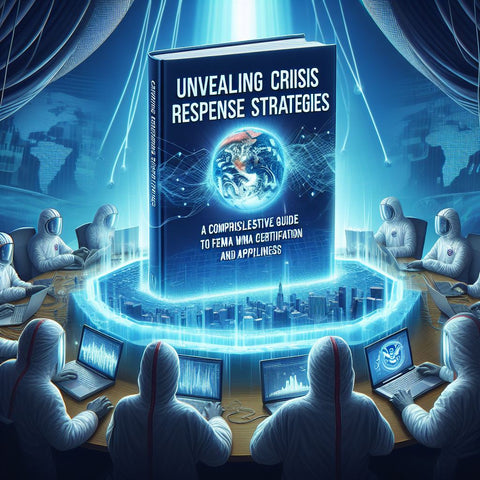
Unveiling Crisis Response Strategies: A Comprehensive Guide to FEMA Certifications and Their Application in Business
In today's world, where uncertainties abound, the ability to respond effectively to crises is crucial for both governmental agencies and businesses. Whether facing natural disasters, cyber threats, or global pandemics, organizations must be equipped with the necessary skills and strategies to navigate through turbulent times and emerge resilient. The Federal Emergency Management Agency (FEMA) stands as a cornerstone in this landscape, offering guidance, training, and certifications to individuals and organizations alike, aiming to bolster their preparedness and response capabilities. This comprehensive guide explores FEMA certifications and their application in business, shedding light on key exams and their relevance in crisis management.

Understanding FEMA Certifications
FEMA offers a diverse array of training courses and certifications through its Emergency Management Institute (EMI). These certifications cover various facets of emergency management, including preparedness, response, recovery, and mitigation. By completing FEMA certifications, individuals and organizations demonstrate their proficiency in crisis response and management, enhancing their ability to safeguard lives, property, and communities.
Key FEMA Certifications:
- Introduction to Incident Command System (ICS-100): This certification introduces participants to the Incident Command System (ICS), a standardized approach to command, control, and coordination of emergency response. It covers fundamental ICS concepts, organization, and terminology, providing a solid foundation for effective incident management.
- National Incident Management System (ICS-700) Certification: NIMS provides a comprehensive framework for managing incidents of all sizes and complexities. The certification emphasizes interoperability, resource management, and coordination among various stakeholders involved in emergency response.
- ICS for Single Resources and Initial Action Incidents (ICS-200): Building upon the basics of ICS, this certification focuses on the management of single resources and initial action incidents. It delves deeper into ICS organizational structure, incident planning, and resource management principles.
- Introduction to Community Emergency Response Teams (ICS-317): CERT training equips individuals with the skills needed to assist in emergency response efforts within their communities. Participants learn about disaster preparedness, fire safety, medical operations, and search and rescue techniques.
- Emergency Planning Certification (IS-235.C): This certification explores the fundamentals of emergency planning, including the development, implementation, and maintenance of emergency operations plans (EOPs). It covers key concepts such as hazard analysis, risk assessment, and plan evaluation.
Insights from FEMA Certifications

FEMA certifications offer valuable insights into crisis response strategies that can be applied in various contexts, including the business world. Here are some key insights gleaned from FEMA certifications:
- Risk Assessment and Management: Effective crisis management begins with a thorough understanding of risks and vulnerabilities. FEMA certifications emphasize the importance of conducting risk assessments to identify potential hazards and develop mitigation strategies. Businesses can apply this insight by implementing robust risk management processes that encompass various scenarios, from natural disasters to supply chain disruptions.
- Incident Command and Coordination: Clear command and coordination structures are essential for managing emergencies efficiently. FEMA certifications, such as ICS-100 and ICS-200, provide participants with the knowledge and skills needed to establish and operate within an Incident Command System. Businesses can adopt similar command and coordination structures to streamline decision-making and resource allocation during crises.
- Communication Strategies: Effective communication is critical during crises to disseminate information, coordinate response efforts, and maintain public trust. FEMA certifications stress the importance of clear, timely, and accurate communication channels. Businesses can develop communication protocols that define channels, stakeholders, and messages for internal and external communication, ensuring consistent messaging and rapid dissemination of information.
- Resource Management and Allocation: Proper allocation and utilization of resources are essential for effective crisis response. FEMA certifications offer insights into resource management principles, including inventory control, resource tracking, and mutual aid agreements. Businesses can develop resource management plans that outline procedures for resource allocation, procurement, and distribution, ensuring efficient use of available resources during emergencies.
- Training and Capacity Building: Continuous training and capacity building are vital for maintaining readiness and resilience in the face of crises. FEMA certifications provide participants with the knowledge and skills needed to respond effectively to emergencies. Businesses can invest in training programs and exercises to enhance employees' preparedness and response capabilities, ensuring they are equipped to handle various crisis scenarios.
Application in Business

The insights gleaned from FEMA certifications have direct relevance to businesses across industries. By incorporating principles of emergency management into their operations, businesses can enhance their resilience, mitigate risks, and protect their employees, assets, and reputation. Here's how FEMA certifications can be applied in the business context:
- Develop Comprehensive Crisis Management Plans: Businesses should develop comprehensive crisis management plans that outline roles, responsibilities, and procedures for responding to different types of emergencies. These plans should be regularly reviewed, updated, and tested through simulations and exercises to ensure effectiveness.
- Establish Communication Protocols: Clear communication is essential during crises to avoid confusion and misinformation. Businesses should establish communication protocols that define channels, stakeholders, and messages for internal and external communication. Regular communication drills and exercises can help employees familiarize themselves with these protocols and respond effectively during emergencies.
- Build Resilient Supply Chains: Disruptions in the supply chain can amplify the impact of crises on businesses. To mitigate this risk, businesses should build resilient supply chains that are flexible, diversified, and responsive to changing conditions. This may involve identifying alternative suppliers, implementing inventory management strategies, and investing in technologies that enhance supply chain visibility and transparency.
- Invest in Training and Education: Businesses should invest in training and education programs to equip employees with the knowledge and skills necessary for effective crisis response. FEMA certifications, such as ICS and NIMS, offer valuable training resources that can enhance employees' preparedness and response capabilities.
- Engage with the Community: Businesses should actively engage with the community and contribute to local resilience-building efforts. This can involve participating in community preparedness events, supporting emergency response initiatives, and collaborating with local authorities and nonprofit organizations. By strengthening community partnerships, businesses can enhance their ability to respond effectively to crises and contribute to the overall resilience of the community.
Conclusion
FEMA certifications provide valuable training and insights into crisis response strategies that can be applied in various contexts, including the business world. By understanding the principles of emergency management and incorporating them into their operations, businesses can enhance their resilience, mitigate risks, and protect their employees, assets, and reputation. Investing in FEMA certifications, developing comprehensive crisis management plans, establishing communication protocols, building resilient supply chains, and engaging with the community are essential steps towards fostering a culture of preparedness and ensuring business continuity in the face of adversity. Embracing the lessons learned from FEMA certifications can empower businesses to thrive in an uncertain world, ready to tackle whatever challenges may arise.
